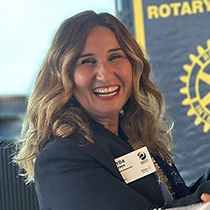
By Ayda Özeren, past governor of District 2440 (Türkiye)
The Olympic Games in Paris are especially delightful this year. They mark a historic milestone in gender equality. After 128 years, an equal number of male and female athletes are participating.
For the first time, the number of male and female athletes will be equal in 28 of the 32 sports that will award medals. The number of mixed-gender events where women and men compete together will increase from 18 to 20. Women will compete in 152 events, while men will compete in 157 events.
We wouldn’t be here if it weren’t for a woman named Stamata Revithi. One hundred and twenty-eight years ago, Revithi became the catalyst for an incredible uprising in sports history when she insisted on running a marathon. She was around 30 and had moved to Athens, Greece, with her two children to find work. She loved long-distance running, so she applied to participate in the Olympic marathon. The International Olympic Committee rejected her application.
Paving the way
Revithi was stubborn. To at least show the Athenians that she could do it, she decided to run the 40-kilometer course on her own the day after the official marathon. She started her run at 8 a.m. and finished in about 5 hours and 30 minutes. During this time, she collected witnesses and documents to verify her run. But when she arrived at the Panathenaic Stadium, soldiers prevented her from entering. This historic moment became a symbol of the struggle for women’s participation in the Olympics. Revithi paved the way for women to compete in the next Games.
Since then, diversity, inclusion, and equal opportunity have become the Olympics’ most important values. In the 1936 Berlin Olympics hosted by Nazi Germany, African American athlete Jesse Owens defied the racist rhetoric of the host country by winning four gold medals. His long-jump record remained unbroken for 25 years.
The 1980 and 1984 Olympics failed to provide equal opportunities and inclusiveness due to politics. The United States boycotted the 1980 Moscow Olympics to protest the Soviet invasion of Afghanistan, and the Soviet Union retaliated by boycotting the 1984 games in the U.S. For athletes in both countries, years of preparation were wiped out.
My own country made its first appearance at the Paris Olympic Games 100 years ago, with 40 athletes. All our representatives that year were men. But Turkey did have a commitment to women’s sports. Mustafa Kemal Atatürk considered sports something that determined the level of development of a country. In 1926, to enable women’s participation, specialists were brought from Sweden to train Turkey’s first female physical education teachers at the Çapa Girls’ Teacher School.
The last Olympic Games Atatürk witnessed was the 1936 Berlin Olympics. Here, Turkey not only won its first medals but was represented by female athletes for the first time. Halet Çambel and Suat Fetgeri Aşeni, who competed in fencing, were the first Muslim female athletes to compete in the Games. In this year’s Olympics, a total of 102 Turkish athletes – including 54 women and 48 men – will participate in 18 sports.
Olympic motto
The Olympic motto is “Citius, Altius, Fortius,” or “Faster, Higher, Stronger.” Can we be faster if one of us is missing? Can we reach higher if we separate a few of us? Is there a possibility of being stronger if we do not include everyone? I don’t think so.
I believe the Olympics brings us closer to global citizenship. I believe that sports, like art, will heal us by using the ointments of universality and diversity. I believe that competition under the roof of friendship blunts the power struggles in our souls.
That’s why, Paris, I’m eagerly waiting for you. I wish all our athletes success.
https://blog.rotary.org/2024/08/02/celebrating-diversity-in-the-2024-olympic-games/
